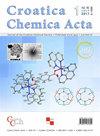Some Microstructural Properties of Zinc Borosilicate Glass as a Possible Matrix in the Immobilization of Various Wastes
IF 0.9
4区 化学
Q4 CHEMISTRY, MULTIDISCIPLINARY
引用次数: 0
Abstract
Zinc borosilicate glass with optimized chemical composition was synthesized and doped with 5 wt % α-Fe2O3. XRD, 57Fe Mössbauer, FT-IR, UV/Vis/NIR and FE SEM were used as the characterization methods. XRD showed the amorphous nature of the samples synthesized. 57Fe Mössbauer spectra confirmed the superposition of Fe3+ in tetrahedral and Fe2+ in octahedral positions. FT-IR spectra showed general features characteristic of different borosilicate glasses. The NIR band at 1116 nm in the UV/Vis/NIR spectrum was assigned to the Fe2+ transition, whereas the Fe3+ transition bands could not be assigned due to the overlapping of several spectral bands of different origin in the UV region centered at 282 nm and the Vis region between 415 to 496 nm. Zinc borosilicate glass as synthesized can be considered as a possible matrix in the immobilization of nonradioactive as well as radioactive wastes.硼硅酸锌玻璃作为各种废物固定化基质的一些微观结构特性
合成了化学成分优化的硼硅酸锌玻璃,并掺杂了5 wt % α-Fe2O3。采用XRD、57Fe Mössbauer、FT-IR、UV/Vis/NIR、FE - SEM等表征方法。XRD表征了所合成样品的无定形性质。57Fe Mössbauer光谱证实了Fe3+在四面体位置和Fe2+在八面体位置的叠加。FT-IR光谱显示了不同硼硅酸盐玻璃的一般特征。在紫外/可见/近红外光谱中,1116 nm处的NIR波段归属于Fe2+跃迁,而在以282 nm为中心的紫外区和415 ~ 496 nm之间的Vis区,由于多个不同来源的光谱带重叠而无法归属于Fe3+跃迁。合成的硼硅酸锌玻璃可以被认为是一种固定非放射性废物和放射性废物的可能基质。
本文章由计算机程序翻译,如有差异,请以英文原文为准。
求助全文
约1分钟内获得全文
求助全文
来源期刊

Croatica Chemica Acta
化学-化学综合
CiteScore
0.60
自引率
0.00%
发文量
3
审稿时长
18 months
期刊介绍:
Croatica Chemica Acta (Croat. Chem. Acta, CCA), is an international journal of the Croatian Chemical Society publishing scientific articles of general interest to chemistry.
 求助内容:
求助内容: 应助结果提醒方式:
应助结果提醒方式:


